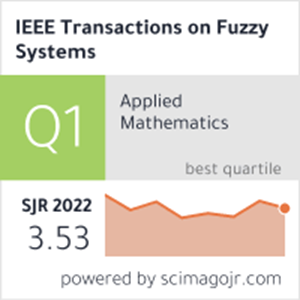Adjacency-Aware Fuzzy Label Learning for Skin Disease Diagnosis
IF 11.9
1区 计算机科学
Q1 COMPUTER SCIENCE, ARTIFICIAL INTELLIGENCE
引用次数: 0
Abstract
Automatic acne severity grading is crucial for the accurate diagnosis and effective treatment of skin diseases. However, the acne severity grading process is often ambiguous due to the similar appearance of acne with close severity, making it challenging to achieve reliable acne severity grading. Following the idea of fuzzy logic for handling uncertainty in decision-making, we transforms the acne severity grading task into a fuzzy label learning (FLL) problem, and propose a novel adjacency-aware fuzzy label learning (AFLL) framework to handle uncertainties in this task. The AFLL framework makes four significant contributions, each demonstrated to be highly effective in extensive experiments. First, we introduce a novel adjacency-aware decision sequence generation method that enhances sequence tree construction by reducing bias and improving discriminative power. Second, we present a consistency-guided decision sequence prediction method that mitigates error propagation in hierarchical decision-making through a novel selective masking decision strategy. Third, our proposed sequential conjoint distribution loss innovatively captures the differences for both high and low fuzzy memberships across the entire fuzzy label set while modeling the internal temporal order among different acne severity labels with a cumulative distribution, leading to substantial improvements in FLL. Fourth, to the best of our knowledge, AFLL is the first approach to explicitly address the challenge of distinguishing adjacent categories in acne severity grading tasks. Experimental results on the public ACNE04 dataset demonstrate that AFLL significantly outperforms existing methods, establishing a new state-of-the-art in acne severity grading.邻接感知模糊标签学习用于皮肤病诊断
痤疮严重程度的自动分级对于皮肤病的准确诊断和有效治疗至关重要。然而,痤疮严重程度分级过程往往是模棱两可的,由于痤疮相似的外观与接近的严重程度,使其具有挑战性,以实现可靠的痤疮严重程度分级。根据模糊逻辑处理决策不确定性的思想,将痤疮严重程度分级任务转化为模糊标签学习(FLL)问题,提出了一种新的邻接感知模糊标签学习(AFLL)框架来处理该任务中的不确定性。AFLL框架做出了四个重要贡献,每一个都在广泛的实验中证明是非常有效的。首先,我们引入了一种新的邻接感知决策序列生成方法,该方法通过减少偏置和提高判别能力来增强序列树的构造。其次,我们提出了一种一致性导向的决策序列预测方法,该方法通过一种新的选择性掩蔽决策策略来减轻分层决策中的错误传播。第三,我们提出的顺序联合分布损失创新地捕捉了整个模糊标签集的高低模糊隶属度的差异,同时用累积分布对不同痤疮严重程度标签之间的内部时间顺序进行建模,从而大大改善了FLL。第四,据我们所知,AFLL是明确解决在痤疮严重程度分级任务中区分相邻类别的挑战的第一种方法。在公共ACNE04数据集上的实验结果表明,AFLL显著优于现有方法,建立了痤疮严重程度分级的新技术。
本文章由计算机程序翻译,如有差异,请以英文原文为准。
求助全文
约1分钟内获得全文
求助全文
来源期刊

IEEE Transactions on Fuzzy Systems
工程技术-工程:电子与电气
CiteScore
20.50
自引率
13.40%
发文量
517
审稿时长
3.0 months
期刊介绍:
The IEEE Transactions on Fuzzy Systems is a scholarly journal that focuses on the theory, design, and application of fuzzy systems. It aims to publish high-quality technical papers that contribute significant technical knowledge and exploratory developments in the field of fuzzy systems. The journal particularly emphasizes engineering systems and scientific applications. In addition to research articles, the Transactions also includes a letters section featuring current information, comments, and rebuttals related to published papers.
 求助内容:
求助内容: 应助结果提醒方式:
应助结果提醒方式:


